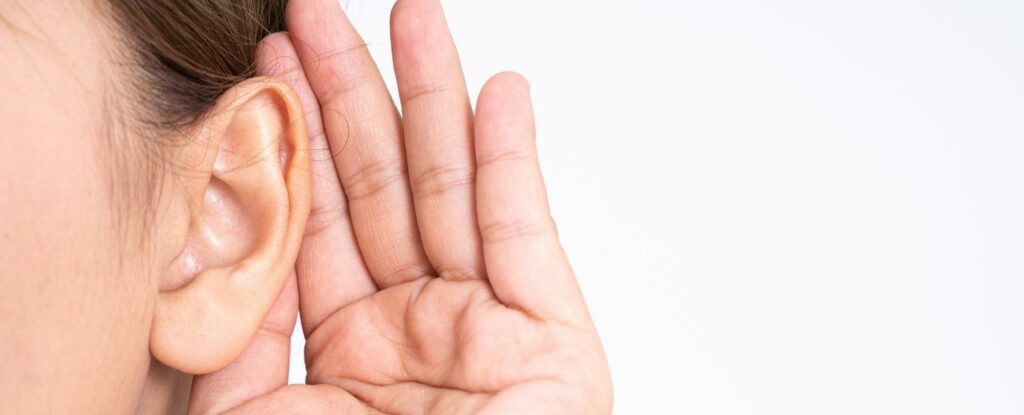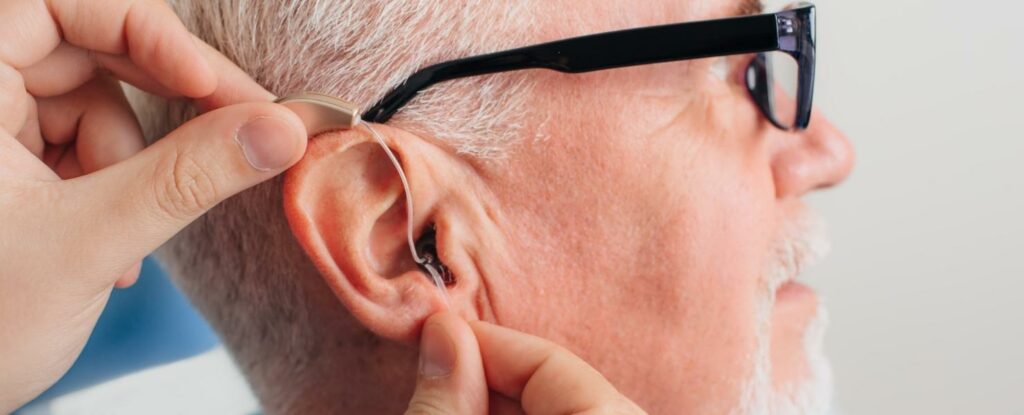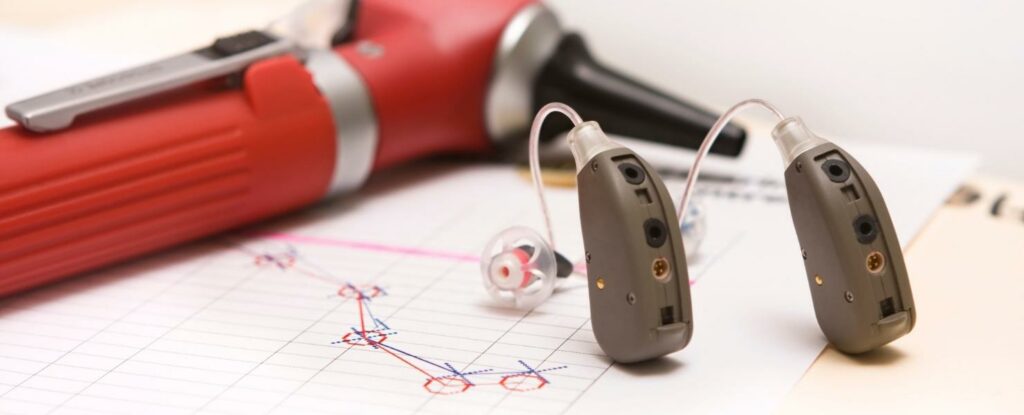Do you think that you need a hearing aid? Sometimes, the need for a hearing aid may not be obvious, but your partner may tell you that you should get one. You’re not alone. About one in three people between ages 65 and 74 have hearing loss and half of those age 75 and older have trouble hearing, according to the National Institute on Deafness and Other Communication Disorders (NIDOC). If you fall into these statistics, it’s understandable that you want to find the best hearing aid possible.
Hearing loss is twice as prevalent as diabetes or cancer and is the third most common physical condition in the U.S., according to the Centers for Disease Control and Prevention.
Age-related hearing loss often happens because of changes to the inner ear or middle ear. It also can occur because of changes on nerve pathways that connect the ear to the brain, NIDOC reports. Other things that can affect hearing loss include:
- The use of certain medications, such as some chemotherapy drugs
- Long-term exposure to loud noise
- High blood pressure
- Diabetes
Hearing loss tends to occur equally in both ears. It is also more prevalent in men than women, although both sexes experience hearing loss with age.
Hearing loss isn’t something you should ignore. It can have some negative health effects, including:
- Social isolation, because you feel less tuned in to what friends, family members, and neighbors are saying. You could end up feeling out of the loop.
- A higher risk for depression and anxiety.
- An increased risk for dementia. Sometimes, the symptoms of hearing loss could lead loved ones to assume you have dementia when it’s really untreated hearing loss.
When you lose hearing, parts of your brain associated with auditory processing often will become smaller.
7 Symptoms of Hearing Loss

Although you should speak with your primary care provider or an audiologist about hearing loss and the need for hearing aids, it’s helpful to know some of the symptoms that indicate hearing loss. They include:
- Thinking that everyone around you is mumbling (some people do mumble, but not everyone)
- Trouble hearing and understanding conversations in places like a noisy restaurant
- Frequently asking others to repeat themselves
- Turning up the volume on your radio, TV, or phone
- Trouble hearing high-pitched sounds, such as a doorbell or alarm clock
- Trouble hearing consonants
- Finding you have to avoid certain social situations because you have trouble hearing
If you have a couple of these symptoms, talk to your primary care provider or an audiologist about getting your hearing checked. NIDOC also has a short quiz to help assess whether you may have a hearing problem, found here. Scroll down to “How can I tell if I have a hearing problem?”
How a Hearing Aid Fits In

If your image of a hearing aid is a brownish shrimp-sized device that everyone can see, then we need to welcome you to modern hearing aids. Today’s hearing aids, particularly the best hearing aids, are often a lot smaller and tech-savvy. Some hearing aids are so small, others won’t even know that you wear one and many can even sync to your phone via bluetooth.
There are a few advantages to getting a hearing aid if you need one:
- You can participate comfortably in social situations, even in louder settings.
- It will help you hear better whether you’re having a one-to-one conversation, watching TV, or with a group of people.
- Hearing aids can help get rid of annoying background noise.
- Hearing aids may slow down dementia. The research in this area is still underway, but it looks promising.
How Hearing Aids Work

Before you’re ready to choose the best hearing aid for you, it’s helpful to have a better understanding of how they work. Hearing aids carry sounds from your environment and into your ear to make them louder, according to the Mayo Clinic. Hearing aids have small microphones that collect those sounds around you and a computer chip with an amplifier that changes the incoming sound into digital code. The hearing aid will adjust the sound according to your hearing loss and listening needs. Those signals are then made into sound waves and delivered to your ears through speakers.
For the most part, today’s hearing aids are digital and have a traditional hearing aid battery or a rechargeable battery. A rechargeable battery can save on the hassle of purchasing or running low on traditional batteries.
Today’s hearing aids vary a lot in size and style. As you might imagine, this also affects the cost of a hearing aid. Here are some of the different hearing aid styles, as shared by the Mayo Clinic:
- Completely in the canal, which is molded to fit in your ear canal. These tend to be the smallest hearing aids and help improve mild to moderate hearing loss.
- In the canal, which is molded to fit partially in the ear canal. This type is geared toward mild to moderate hearing loss.
- In the ear, which can fill most of the bowl-shaped area of your outer ear or only the lower part. These are good for mild to severe hearing loss.
- Behind the ear, which hooks on the top of your ear. This is used for any degree of hearing loss.
- Receiver in the canal/receiver in the ear, which are similar to behind-the-ear hearing aids but use a small wire rather than a tube to connect the piece behind the ear to a speaker or receiver.
6 Tips to Choose the Best Hearing Aid for You

Now that you know more about hearing aid technology, let’s share some of the best tips to help find the right hearing aid for you.
- Think about price. Hearing aids are not always covered by Medicare or insurance. However, some federal workers, veterans and residents in certain states can find coverage for hearing aids. The average hearing aid price is $1,000 to $4,000 and $2,000 to $6,000 for both ears. Speak with your audiologist about hearing aid options that you can afford. If you have Medicare Advantage, you may be able to get coverage for some of the hearing aid cost. Private insurance may cover some of the cost as well but not all.
- Shop around for good deals, and don’t be afraid to ask for a discount. Certain retailers and audiologist offices may have special sales on hearing aids. If price is a concern, do your homework to find where the good deals are. No matter where you choose to buy your hearing aid, don’t be afraid to ask for a discount. A Consumer Reports survey found that while only 14% of those surveyed asked for a lower price, about half of those who did ask for it got a better deal.
- See if you can test drive the hearing aid. This would be a trial period, perhaps a week or so, where you can see if you like the hearing aid. Although you do need to pay some money toward the trial period, this is an ideal way to assess a hearing aid’s pros and cons before you spend even more.
- Ask your audiologist how long the hearing aid will last. In other words, if your hearing becomes worse in the next couple of years, will the hearing aid you choose still be able to help you? Hearing aids typically last five years, so you’ll want to make sure the one you select has some staying power.
- Think about the technology that drives up the cost. For instance, noise reduction and directional microphones are commonly used with hearing aids nowadays. However, Bluetooth connectivity is one of those neat features that can raise the price. If you think you’ll use it, great. If not, then an economy hearing aid may work just fine for you.
- Be clear on your warranty details. A warranty will help cover labor and parts for any hearing aid repairs over a specific time. Sometimes, office visits and professional services will be part of the warranty. Know in advance what’s covered in case you need those repairs.








One thought on “6 Tips to Choose the Best Hearing Aid”
My dad has been having a hard time hearing things lately, and he’s not sure what to do about it. It makes sense that he might want to get a hearing aids. That seems like a good way to ensure that he can hear properly.